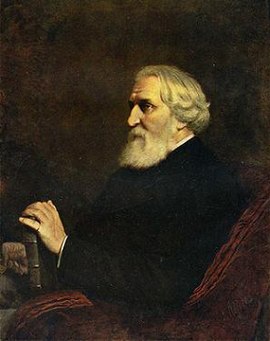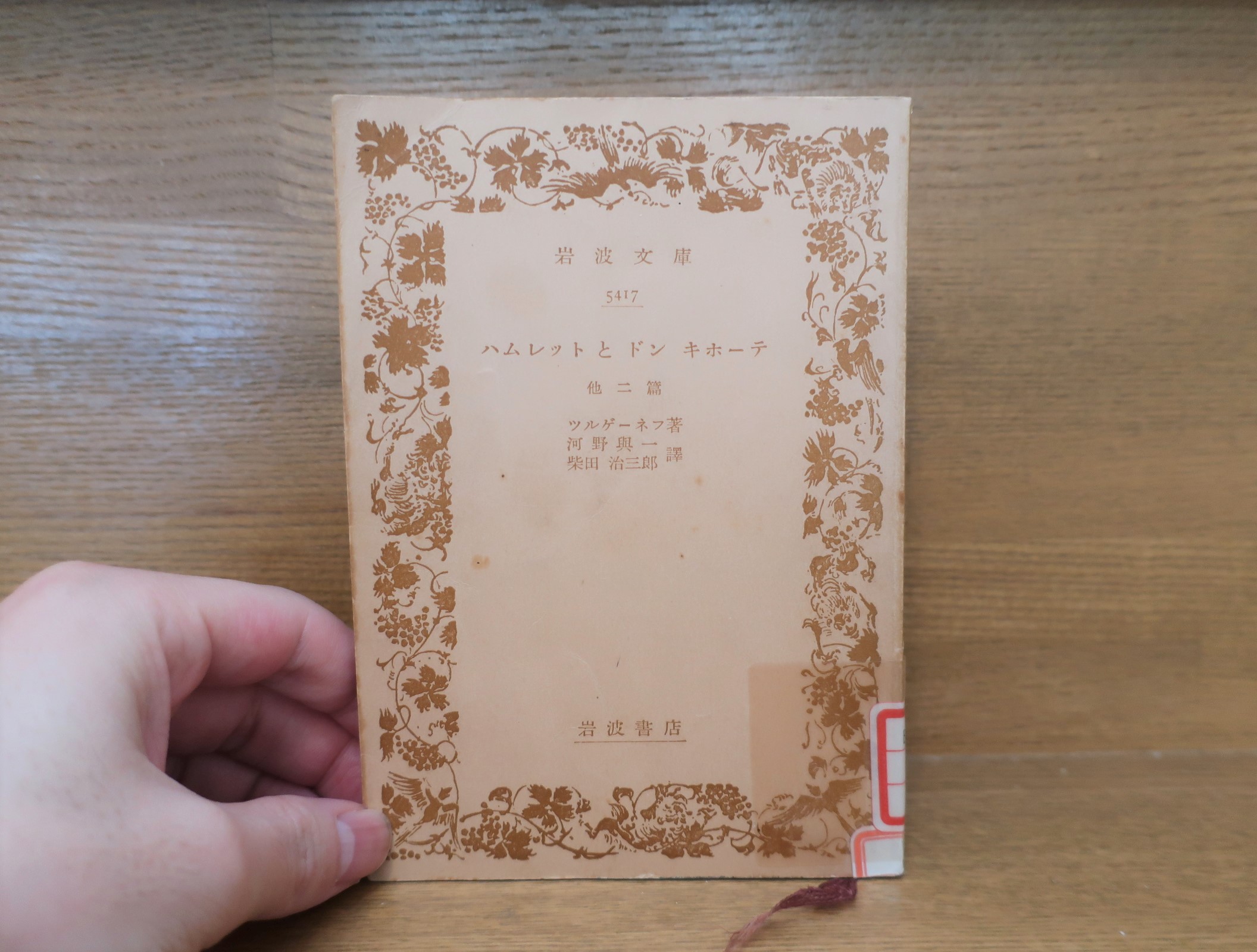Synopsis of Turgenev's "Hamlet and Don Quixote" - recommended for an introduction to Turgenev's literary views.

Turgenev (1818-1883)Wikipedia.
Hamlet and Don Quixote is a dissertation based on a lecture given by Turgenev in 1860.
I read "Hamlet and Don Quixote," translated by Yoichi Kono, from the book "Hamlet and Don Quixote" published by Iwanami Shoten.
The commentary at the end of this book was very clear, so we will introduce a summary and commentary together, using this as a reference.
Let's take a quick look.
Hamlet and Don Quixote" is a well-known article from a lecture given in 1860.
Turgenev contrasts Hamlet and Don Quixote as "centripetal" and "centrifugal," respectively, a man of the head who thinks and does nothing, a man of the emotions who acts on impulse without reflection and whose actions are always confused, an egoist who cares only about himself and will not move a straw for the sake of others, and a doer who believes in truth and ideals and sacrifices nothing but his own self to save the oppressed. The egoist, who is preoccupied with himself and will not move a straw for the sake of others, is juxtaposed against the doer, who believes in truth and ideals and sacrifices himself to save the oppressed.
Turgenev was interested in these two types of characters from early on, and his 1845 rhymed novel "Dialogue" is already a dialogue between two such people, and he went on to depict both types in many of his works.
Litvinov in "Smoke" and Cernin in "Spring Water" are in the Don Quixote mold.
The Hamlet type is a particular favorite of mine, not to mention "Hamlet of the Szitiglóf County," Luzhin, the protagonist of "The Diary of a Superfluous Man," the man Asha fell in love with, and many others, all of whom are more or less Hamlets.
In these characters, Turgenev tried to portray various types of people: those who are talented and educated but lack determination and passion, those who are orators but actually incompetent, those who are overly conscious and reflective but never do anything, and those who attract women but run away when the time comes. In Shakespeare's Hamlet, I saw the most striking example of this.
Iwanami Shoten, Hamlet and Don Quixote, translated by Yoichi Kono and Jisaburo Shibata, p. 121-122
*Some lines have been changed, and the old style of writing has been changed to the new style.
This piece is a paper in which Turgenev expresses his thoughts on Hamlet and Don Quixote.
For Turgenev, these two characters were a very important influence in the creation of his works, and their faces are everywhere in his works.
Hamlet" is one of Shakespeare's most famous works, so many of you may be familiar with its contents and synopsis.
However, when it comes to Don Quijote, even if people know the name, its contents are not well known.
I have previously briefly described that Don Quijote in my article, so if you are interested, please refer to the following.
Turgenev's juxtaposition of Hamlet and Don Quixote highlights the two characters.
Turgenev sees the Hamlet type, who is always fretting about himself, and the Don Quixote type, who always acts for the good of others.
Let's continue to look at the explanations.
Turgenev was not the first to see Hamlet as such a man. Goethe saw Hamlet as a thoroughly indecisive skeptic who had been crushed by the weight of the task that had been placed upon him (see "Wilhelm Meistel's Apprenticeship").
This image of Goethe's Hamlet was created in a Romantic mood, but it has to some extent defined the subsequent view of Hamlet, and it has become common knowledge, so to speak, that Hamlet is such a person.
Turgenev's view is also in that vein, in the sense that he sees Hamlet in a negative light, but Turgenev's view is also very different from Goethe's, especially in his emphasis on Hamlet's egoism.
According to Turgenev, Hamlet does not believe in anything external to himself. He is always concerned only with his inner self and cannot accomplish anything. Because he is so self-centered, he is incapable of loving others and is willing to do cruel things. He talks big, but he never moves a step, so he cannot move others.
Iwanami Shoten, Hamlet and Don Quixote, translated by Yoichi Kono and Jisaburo Shibata, p. 122-123
*Some lines have been changed, and the old style of writing has been changed to the new style.
Turgenev is strongly influenced by Goethe's view of Hamlet. The view of Hamlet as an indecisive skeptic who can do nothing has its roots there.
However, I have also read "Hamlet" many times and seen it on stage, and honestly I have my doubts about such a view. I wonder if Hamlet really is such a person. I wonder if Hamlet is really that kind of a person, rather than an admirable person who fights against his destiny while suffering from his troubles.
As if to answer such questions, the commentary continues as follows.
But is Shakespeare's Hamlet really the man that Goethe and Turgenev saw him as? Of course, Hamlet's complex character has those traits, depending on the circumstances of the moment.become apparent (e.g. trends, effects)It may be.
However, when we look at "Hamlet" as a whole, without being bound by conventional images of Hamlet, we can see Hamlet'sessenceseems to be something much different.
The sincerity to his late father, the love for his mother, the prudence in trying to ascertain his uncle's guilt, the quick and decisive action after being sent to England to fight his uncle, and the honorable end when he encourages his best friend to take care of things for him. It is hard to believe that Hamlet is not only an indecisive skeptic and a ruthless egoist.
Of course, Hamlet as seen by Turgenev is an aspect of the true Hamlet. Turgenev has clearly carved out this aspect of Hamlet through a detailed analysis of Shakespeare's works. Therefore, this is a valuable document for understanding Hamlet.
Still, why was that aspect of Hamlet in particular problematic for Turgenev?
Of course, Goethe's suggestion must have been strongly implied. However, as I mentioned earlier, Turgenev has always used characters of the so-called Hamlet type as protagonists in his own works. Such a character was a challenge for Turgenev.
So it is probably closer to the truth that when he read Shakespeare's Hamlet, he read in Hamlet's character a particularly strong sense of what Turgenev himself had plainly problematic.
Turgenev, who had good intentions by nature, was often criticized by his senior colleague Belinsky for being lazy, irresponsible, and irresponsible, and for talking big but not doing what he said.
Turgenev felt especially strongly about the negative aspects of Hamlet because he believed that he had found in Hamlet a character that he had always deeply regretted. The same psychology seems to have been at work in his interpretation of Faust.
Iwanami Shoten, Hamlet and Don Quixote, translated by Yoichi Kono and Jisaburo Shibata, p. 123-124.
*Some lines have been changed, and the old style of writing has been changed to the new style.
The character that Turgenev found in Hamlet was also his own problem.
In this light, the Hamlet-like people who pervade all of Turgenev's works are all largely related to Turgenev's own problems.
It seems safe to assume that Turgenev felt particularly strongly about the negative aspects of Hamlet, which is how much we know about him.
The paper then goes on to discuss Don Quixote in counterpoint to Hamlet.
Let's look at the explanation of this one as well.
Don Quixote was not merely cited as an inspiration for Hamlet. Turgenev had an early interest in Don Quixote.
When he was annoyed by the readers' lack of understanding of "Luzhin," he once said that he was going to give up writing and work on the translation of "Don Quixote" (letter to his friend Boatkin, 1857).
Turgenev's understanding of "Don Quixote" is rather better than that of "Hamlet," and he has a wonderful grasp of the adventurous and humorous nature of Don Quixote. Turgenev's theory of "Don Quixote" seems to have not lost its position as a legitimate interpretation of this work. (See Iwanami Bunko's "Don Quixote", vol. 1, p. 55.)
Turgenev recognizes the significance of Don Quixote's constant beating by the people, and says that the people, after all, go forward, seek, fall, and follow the man whom they have ridiculed, cursed, and persecuted, with their spiritual eyes fixed on a purpose that they alone see, without fear of persecution, curse, or ridicule, They believe unconditionally in and follow in the footsteps of those who rise up and finally find their purpose.
Turgenev gave this lecture shortly after he was separated from his colleagues at the magazine Sovremennik due to the ill will of some people.
In each of his subsequent works, from "Father and Son" onward, Turgenev was met with incomprehension by his readers and, at times, a storm of heated criticism.
In reality, however, the ripple of sympathy for the serfs that Turgenev aroused with his story eventually developed into a great wave of serf emancipation in Russia, and the long-standing affection for Turgenev that had built up in the people's hearts was expressed in the fact that more than a million people attended Turgenev's funeral. The people's long-lasting respect for Turgenev is reflected in the fact that a countless number of people attended his funeral.
So, at least from the end of the day, I think we can say that Turgenev's own fate is also projected onto the fate of Don Quixote as depicted here.
Iwanami Shoten, Hamlet and Don Quixote, translated by Yoichi Kono and Jisaburo Shibata, p. 124-125
*Some lines have been changed, and the old style of writing has been changed to the new style.
This was a surprise to me as well. I was shocked to learn that Turgenev had looked up to Pushkin as his life-long teacher, but to think that even Don Quixote had a tremendous influence on him...!
After all, Don Quijote is extraordinary.
In the history of the world, there are countless great people who revered Don Quixote.
In Cuba, where I traveled last year, the revolutionary Che Guevara was reportedly a fan of Don Quixote.
And of course, Dostoevsky was greatly influenced by Don Quixote.
This is evident in one of his best-known works,The Moron.This is a work called
Turgenev and Dostoevsky were lifelong rivals.
It is very interesting to note that both of these artists have Pushkin as their greatest teacher and Don Quixote as an influence.
The two artists created works in different styles while respecting the same person.
I felt once again that these two artists are perfect for feeling the difference in the works produced by the life and temperament of the author.
This paper is very important for understanding Turgenev's view of literature. And it was also very interesting to learn about Dostoevsky.
The Iwanami Shoten's "Hamlet and Don Quixote" introduced here includes not only "Hamlet and Don Quixote" but also "The Faustian Theory" and "The Pushkin Theory".
In particular, "Pushkin's Treatise" is based on a manuscript from his last year of his Pushkin Lectures. That's right. The Pushkin lecture where Dostoevsky and Turgenev had their final showdown.
The Pushkin Lecture was the last and biggest direct confrontation between the two.
The materials from Dostoevsky's side are rather well known to the public, but Pushkin's lecture from Turgenev's side is surprisingly unknown.
In this sense, the book is a valuable resource.
We encourage anyone interested in Turgenev to pick up a copy of this work.
The above is a synopsis of Turgenev's "Hamlet and Don Quixote" - recommended for an introduction to Turgenev's literary views.
Next Article.
Click here for a list of Turgenev's recommended works.
Related Articles





































